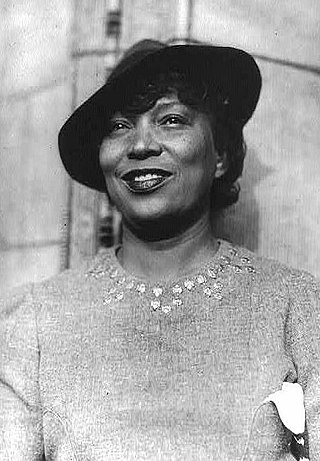
Zora Neale Hurston was an American author, anthropologist, and filmmaker. She portrayed racial struggles in the early-20th-century American South and published research on hoodoo. The most popular of her four novels is Their Eyes Were Watching God, published in 1937. She also wrote over 50 short stories, plays, and essays.

Grenada is a city in Grenada County, Mississippi, United States. The population was 13,092 at the 2010 census. It is the county seat of Grenada County.
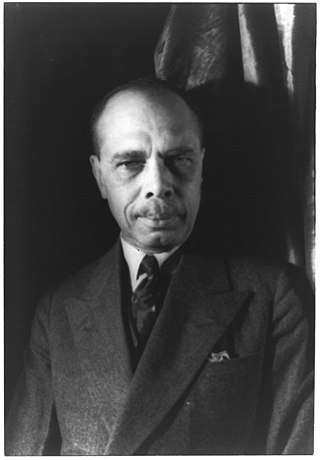
James Weldon Johnson was an American writer and civil rights activist. He was married to civil rights activist Grace Nail Johnson. Johnson was a leader of the National Association for the Advancement of Colored People (NAACP), where he started working in 1917. In 1920, he was chosen as executive secretary of the organization, effectively the operating officer. He served in that position from 1920 to 1930. Johnson established his reputation as a writer, and was known during the Harlem Renaissance for his poems, novel and anthologies collecting both poems and spirituals of Black culture. He wrote the lyrics for "Lift Every Voice and Sing", which later became known as the Black National Anthem, the music being written by his younger brother, composer J. Rosamond Johnson.

Theodore Gilmore Bilbo was an American politician who twice served as governor of Mississippi and later was elected a U.S. Senator (1935–1947). A demagogue and lifelong Democrat, he was a filibusterer whose name was synonymous with white supremacy. Like many Southern Democrats of his era, Bilbo believed that black people were inferior; he defended segregation, and was a member of the Ku Klux Klan, the United States' most notable white supremacist terrorist organization. He also published a pro-segregation work, Take Your Choice: Separation or Mongrelization.
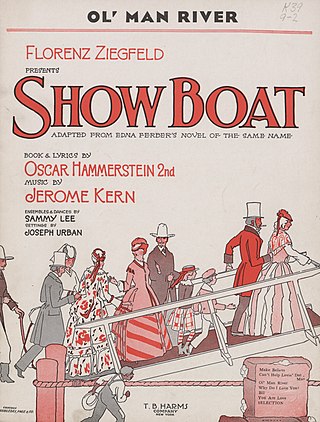
Show Boat is a musical with music by Jerome Kern and book and lyrics by Oscar Hammerstein II. It is based on Edna Ferber's best-selling 1926 novel of the same name. The musical follows the lives of the performers, stagehands and dock workers on the Cotton Blossom, a Mississippi River show boat, over 40 years from 1887 to 1927. Its themes include racial prejudice and tragic, enduring love. The musical contributed such classic songs as "Ol' Man River", "Make Believe", and "Can't Help Lovin' Dat Man".
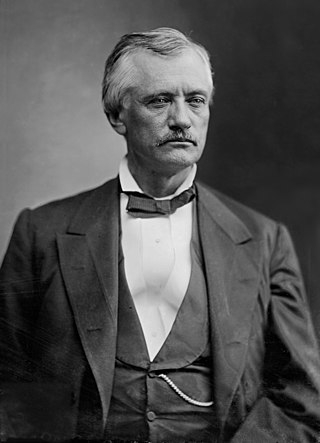
John Tyler Morgan was an American politician who was a brigadier general in the Confederate States Army during the American Civil War and later was elected for six terms as the U.S. Senator (1877–1907) from the state of Alabama. A prominent slaveholder before the Civil War, he became the second Grand Dragon of the Ku Klux Klan in Alabama during the Reconstruction era. Morgan and fellow Klan member Edmund W. Pettus became the ringleaders of white supremacy in Alabama and did more than anyone else in the state to overthrow Reconstruction efforts in the wake of the Civil War. When President Ulysses S. Grant dispatched U.S. Attorney General Amos Akerman to prosecute the Klan under the Enforcement Acts, Morgan was arrested and jailed.

Fredericka Carolyn "Fredi" Washington was an American stage and film actress, civil rights activist, performer, and writer. Washington was of African American descent. She was one of the first Black Americans to gain recognition for film and stage work in the 1920s and 1930s.
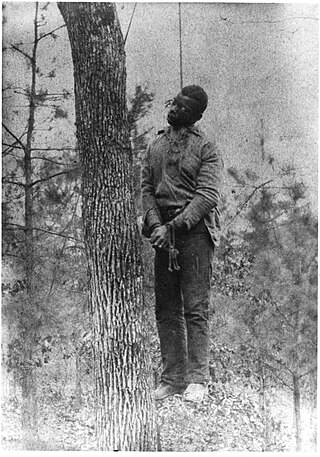
Lynching was the widespread occurrence of extrajudicial killings which began in the United States' pre–Civil War South in the 1830s and ended during the civil rights movement in the 1950s and 1960s. Although the victims of lynchings were members of various ethnicities, after roughly 4 million enslaved African Americans were emancipated, they became the primary targets of white Southerners. Lynchings in the U.S. reached their height from the 1890s to the 1920s, and they primarily victimised ethnic minorities. Most of the lynchings occurred in the American South, as the majority of African Americans lived there, but racially motivated lynchings also occurred in the Midwest and border states. In 1891, the largest single mass lynching in American history was perpetrated in New Orleans against Italian immigrants.
Show Boat is a 1936 American romantic musical film directed by James Whale, based on the 1927 musical of the same name by Jerome Kern and Oscar Hammerstein II, which in turn was adapted from the 1926 novel of the same name by Edna Ferber.

Rose McClendon was a leading African-American Broadway actress of the 1920s. A founder of the Negro People's Theatre, she guided the creation of the Federal Theatre Project's African American theatre units nationwide and briefly co-directed the New York Negro Theater Unit.

Annie Nathan Meyer was an American author, anti-suffragist, and promoter of higher education for women who founded Barnard College. Her sister was activist Maud Nathan and her nephew was author and poet Robert Nathan.
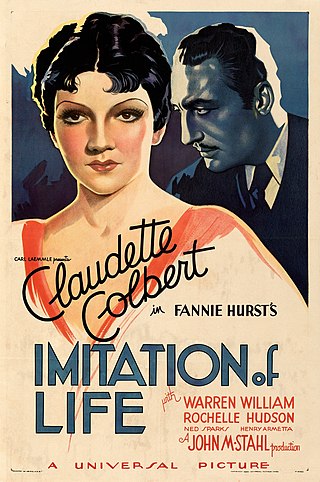
Imitation of Life is a 1934 American drama film directed by John M. Stahl. The screenplay by William Hurlbut, based on Fannie Hurst's 1933 novel of the same name, was augmented by eight additional uncredited writers, including Preston Sturges and Finley Peter Dunne. The film stars Claudette Colbert, Louise Beavers, Warren William, Rochelle Hudson, and Fredi Washington.
The US Hurston/Wright Legacy Awards program honors published Black writers worldwide for literary achievement. Introduced in 2001, the Legacy Award was the first national award presented to Black writers by a national organization of Black writers. It is granted for fiction, nonfiction and poetry, selected in a juried competition.
"Can't Help Lovin' Dat Man" with music by Jerome Kern, and lyrics by Oscar Hammerstein II, is one of the most famous songs from their classic 1927 musical play Show Boat, adapted from Edna Ferber's 1926 novel.
Julie Dozier is a character in Edna Ferber's 1926 novel Show Boat. In the Jerome Kern and Oscar Hammerstein II's classic musical version of it, which opened on Broadway on December 27, 1927, her stage name is Julie La Verne. She is exposed as Julie Dozier in Act I. In Act II, Julie has changed her name, this time to Julie Wendel.
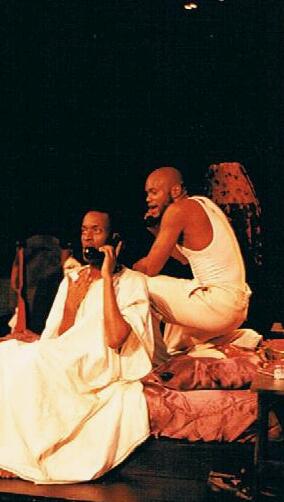
James Baldwin: A Soul on Fire is an American stage play about author and activist James Baldwin. It was written by Howard Simon and first performed in 1999. Originally directed by Chuck Patterson, the first run starred Charles Reese as James Baldwin and Forrest McClendon as his counterpart, an ethereal force which takes multiple identities.

Porgy: A Play in Four Acts is a play by Dorothy Heyward and DuBose Heyward, adapted from the short novel by DuBose Heyward. It was first produced by the Theatre Guild and presented October 10, 1927 – August 1928 at the Guild Theatre in New York City. Featuring a cast of African Americans at the insistence of its authors—a decision unusual for its time—the original production starred Frank Wilson, Evelyn Ellis, Jack Carter, and Rose McClendon. Porgy marked the Broadway directing debut of Rouben Mamoulian. The play ran a total of 55 weeks in New York, and the original cast toured the United States twice and performed for 11 consecutive weeks in London.
Blue-Eyed Black Boy is a 1930 one-act play by Georgia Douglas Johnson, one of the earliest African-American playwrights and an American poet that was a member of the Harlem Renaissance.
Merris Shirley Prendergast was a theater lighting designer notable for being the first African-American woman admitted to the United Scenic Artists’ lighting division in 1969. She was also the first African-American woman lighting designer on Broadway in 1973. Prendergast designed lighting for Broadway shows such as Waltz of the Stork, Amen Corner, and the Paul Robeson one-man show. She designed lighting for fifty years, well into her mid-80s. One of her last productions was Zora Neale Hurston: a Theatrical Biography in 2016.

James Light was an American theatre director, actor, and educator. He is best remembered as a champion of the playwright Eugene O'Neill, and he directed many of his plays both on Broadway and in regional theaters. He was a member of the Provincetown Players, and he succeeded George Cram Cook as director of that organization in 1922. During the Great Depression, he was director of the "Philadelphia Black Unit" of the Federal Theatre Project; an organization dedicated to fighting racial discrimination in hiring practices in the American theatre by producing plays with all-black casts. He taught on the faculties of the Yale School of Drama and The New School for Social Research; serving as the dean of the drama school at the latter institution from 1939 to 1942.














